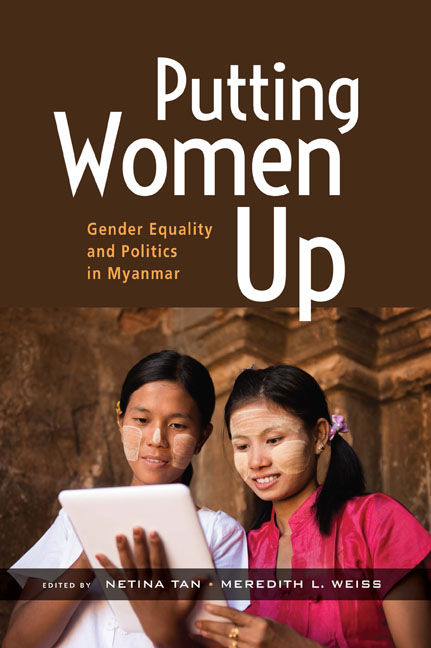Book contents
- Frontmatter
- Contents
- List of Tables
- List of Figures
- Acronyms and Glossary
- Acknowledgements
- About the Contributors
- 1 Putting Women Up: Promoting Gender Equality in Myanmar Politics
- 2 The Secret Garden of Candidate Selection and Women’s Political Participation
- 3 Ethnic Parties, Representation, and Female Candidate Recruitment in Myanmar
- 4 Attitudes Towards Women and Political Leadership
- 5 Violence, Gender, and Politics
- 6 Navigating Local Politics and Gender
- Appendix One Background of Selected Political Parties and Vote Shares
- Appendix Two Survey Questions
- Appendix Three Focus Group Guide for Field Data Collection
- Appendix Four Interview Guide Used for Field Data Collection
- Appendix Five Samples of Elite Interview Questions
- Index
3 - Ethnic Parties, Representation, and Female Candidate Recruitment in Myanmar
Published online by Cambridge University Press: 18 April 2024
- Frontmatter
- Contents
- List of Tables
- List of Figures
- Acronyms and Glossary
- Acknowledgements
- About the Contributors
- 1 Putting Women Up: Promoting Gender Equality in Myanmar Politics
- 2 The Secret Garden of Candidate Selection and Women’s Political Participation
- 3 Ethnic Parties, Representation, and Female Candidate Recruitment in Myanmar
- 4 Attitudes Towards Women and Political Leadership
- 5 Violence, Gender, and Politics
- 6 Navigating Local Politics and Gender
- Appendix One Background of Selected Political Parties and Vote Shares
- Appendix Two Survey Questions
- Appendix Three Focus Group Guide for Field Data Collection
- Appendix Four Interview Guide Used for Field Data Collection
- Appendix Five Samples of Elite Interview Questions
- Index
Summary
Ethnic parties make up a significant portion of the electoral landscape in Myanmar politics. In fact, 48 per cent of the political parties that competed in the 1990 general election were ethnic parties, 62 per cent in 2010, 60 per cent in 2015, and 59 per cent in 2020. Between 1990 and 2020, the proportion of female candidates in Myanmar elections also increased. Are these two trends linked? Is there something distinctive about ethnic parties as a type, and do they more effectively facilitate women's political representation than their catch-all counterparts?
Existing literature highlights the important role of political parties in explaining varying levels of women's representation around the world (Caul 1999; Pitre 2003). Parties play a critical role in recruiting and selecting candidates, thereby contributing to the gender makeup of legislatures and political bodies (Tan et al. 2020). As we discuss in greater detail below, existing literature finds mixed results regarding the effect of ethnic parties. Broad studies on women's representation have often concluded that electoral rules and circumstances that benefit women can also be applied to other marginalized groups, such as ethnic minorities (Matland and Taylor 1997; Caul 1999). Yet, others find a potential for competition between different under-represented identities (Lien et al. 2007), or express fears over patriarchal attitudes among specific ethnic groups that would disadvantage women candidates (Okin 1999).
Ethnic parties might therefore be less likely than catch-all parties to pay attention to gender inequalities (Goetz 1998; Holmsten, Moser, and Slosar 2010). However, ethnic parties seem to perform differently under different electoral rules. Ethnic parties in single-member districts (SMD), where voters elect a single candidate to represent the constituency by plurality or majority vote, have been found to include more women than their catch-all counterparts. However, ethnic parties appear to exclude women—that is, do not nominate female candidates—at an even higher rate in proportional representation (PR) systems, where parties secure seats in larger constituencies per the share of the popular vote they or their candidates win, without gender quotas (Holmsten, Moser, and Slosar 2010). This is perhaps because the nomination and candidate selection decisions in PR systems are more heavily concentrated among the party elite and provide more opportunity for patriarchal attitudes to dominate (ibid.).
Yet, existing literature also suggests a moderating effect of party institutionalization, rather than just electoral rules.
- Type
- Chapter
- Information
- Putting Women UpGender Equality and Politics in Myanmar, pp. 57 - 87Publisher: ISEAS–Yusof Ishak InstitutePrint publication year: 2024



